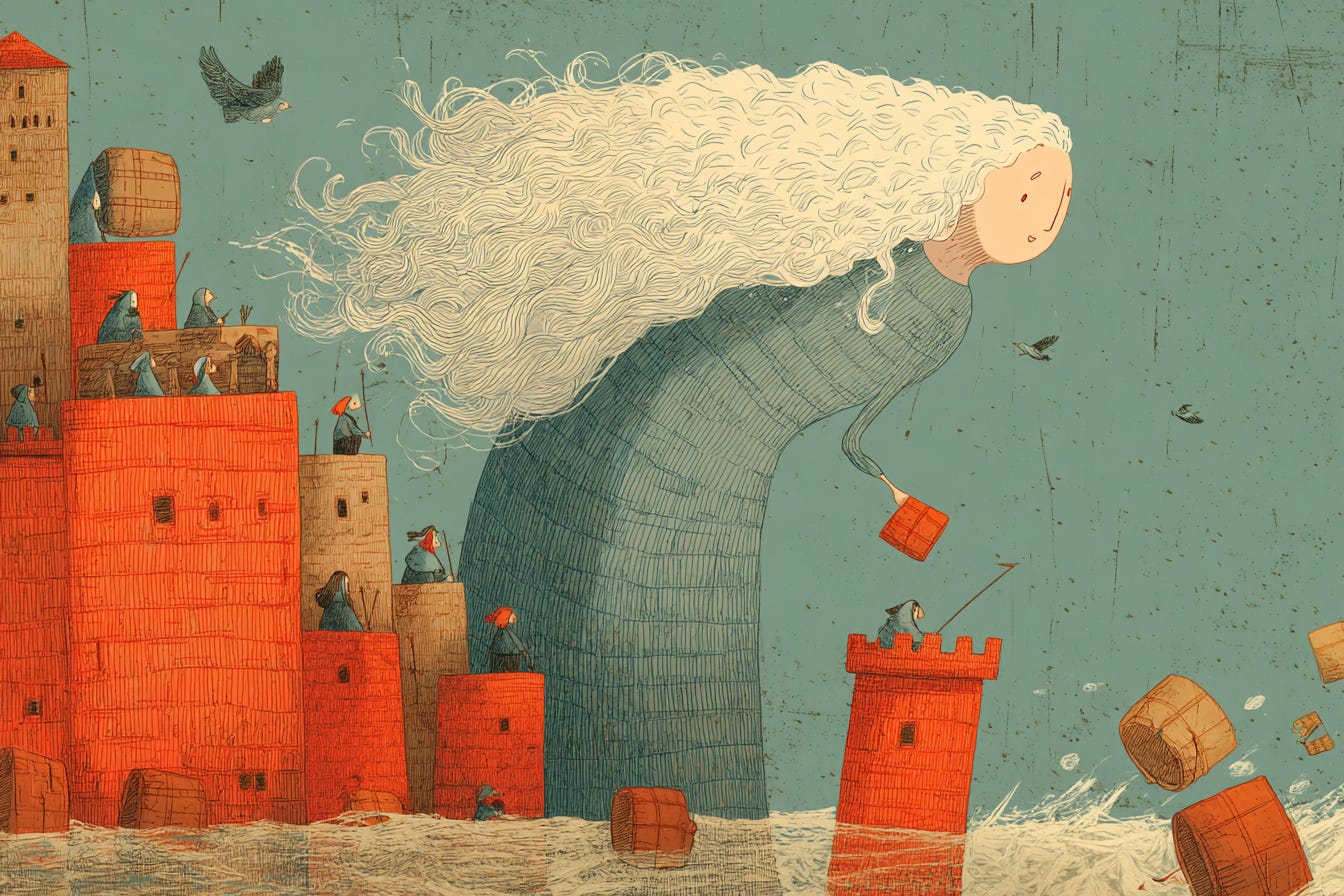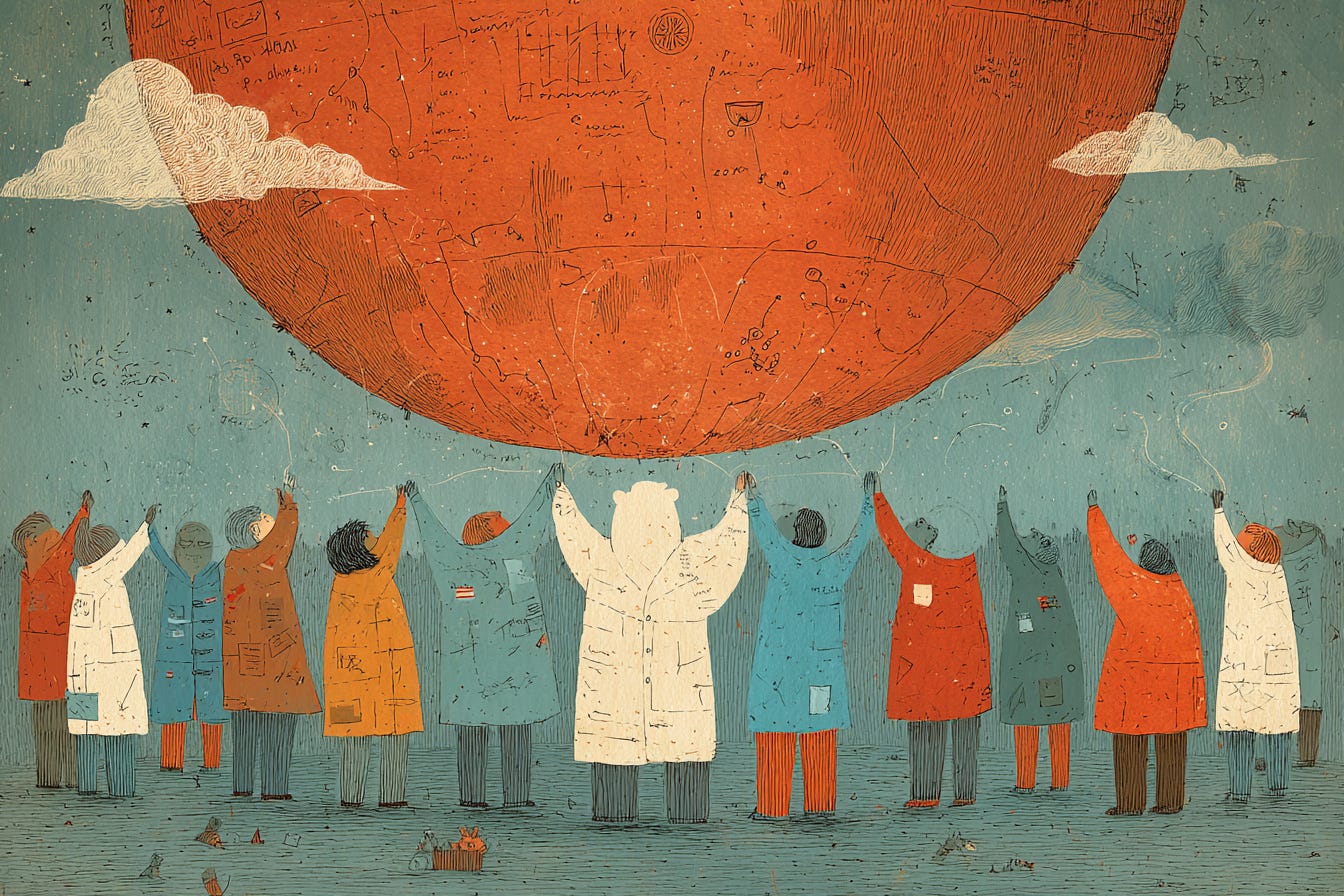I am going to take a short break ~ two or three weeks and come back with some new ideas and readings.
When I started writing about the pauper, reading Machiavelli, commenting on his writings, I wasn't sure where this was going. Machiavelli has, after all, a Machiavellian reputation. But as I continued, I recognized how deeply we have internalized the cognitive style he pioneered. In many ways, we inhabit regimes with far greater power over our lives than anything Machiavelli experienced, and often we don't even question the legitimacy of that power. Indeed, peaceful national societies have provided a prosperity unimaginable in Machiavelli's time. Yet, we now face something Machiavelli never considered—the need to think realistically about the planet itself, not just national entities. The planet is typically absent from everyday politics or romanticized as Gaia. Both perspectives miss the urgency of viewing planetary conditions realistically, particularly given the intense global competition underway.
This reframing—from national politics to planetary challenges—requires us to extract Machiavelli's core insights while transforming their application. We must shift from understanding power as exercised by princes over subjects to power wielded collectively by citizens over their shared fate. The pauper's perspective becomes not just a lens for critique but a position from which to build new forms of planetary agency. With this transformation in mind, let's examine Machiavelli's final chapters and consider their implications for our contemporary planetary predicament.
This week's Pauper essay differs from previous ones; I'll comment on five chapters rather than three. Having understood Machiavelli, my aim now shifts to applying this realist perspective to planetary society, with the people rather than rulers at the center of analysis.
The Prince: Chapters 22-26
In these closing chapters, Machiavelli tackles essential aspects of governance: choosing trustworthy advisors, managing flatterers, understanding the causes behind political failure, confronting the unpredictable power of fortune, and finally, calling for the liberation of Italy from foreign domination.
Advisors and Flatterers
Machiavelli emphasizes the crucial role of ministers, highlighting a ruler's intelligence through the quality of the advisors he selects. A competent advisor reflects the ruler's prudence; a disloyal or self-serving one signals fundamental flaws. Today's rulers still depend heavily on advisors, consultants, and experts—often behind layers of secrecy—echoing Machiavelli's insistence on loyalty and prudence.
For the only way to protect yourself from flattery is by letting it be known that being told the truth does not offend you. However, if anyone may speak frankly to you, respect for you will soon disappear.
Therefore, a prudent ruler will follow another way, and choose shrewd men for his service, permitting them alone to speak frankly, but only when he asks them and not otherwise.
Machiavelli also warns explicitly against flatterers. While flattery appeals to vanity and distorts judgment, the antidote is candid but carefully managed truth-telling. The challenge remains today, evident in echo chambers created by social media algorithms and governments filled with yes-men whose advice reinforces dangerous biases rather than confronting uncomfortable truths.
Losing States and Understanding Fortune
Analyzing Italy's political losses, Machiavelli attributes failure primarily to rulers' complacency and military inadequacies. This critique resonates today in contexts where nations grow complacent during peaceful times, failing to anticipate or manage future crises effectively. Leaders' inability to adapt to changing circumstances remains a timeless cause of political failure.
I am not unaware that many have thought, and many still think, that the affairs of the world are so ruled by fortune and by God that the ability of men cannot control them….When I think about this, I am sometimes inclined, to some extent, to share this opinion… Nevertheless, so as not to eliminate human freedom, I am disposed to hold that fortune is the arbiter of half our actions, but that it lets us control roughly the other half.
Machiavelli then grapples with the notion of fortune, likening it to a powerful river that, when untamed, causes destruction. His famous metaphor—that fortune is a woman who favors boldness—captures the essence of political adaptability. Modern parallels are evident in climate change, pandemics, and financial crises, where governments that fail to prepare adequately face catastrophic consequences. Fortune, or unexpected global disruptions, still rewards decisiveness and punishes inertia.
The Call to Liberate Italy
The book concludes passionately, urging the liberation of Italy from foreign domination, calling upon bold leadership and renewed national spirit (it is also flattering his designated reader, but he’s somewhat subtle about it).
There is no one in whom Italy can now place any hope except your illustrious family which (because it is successful and talented, and favoured by God and by the Church, of which it is now head) can take the lead in saving her.
While deeply nationalistic in context, the chapter's spirit of mobilizing collective resolve and embracing innovative practices is universally relevant today. It is an enduring reminder that decisive, collective action can transform crises into opportunities for meaningful change.
Contemporary Reflections
Today's global crises—climate change, geopolitical fragmentation, digital surveillance—highlight Machiavelli's themes vividly. Advisors and flatterers find contemporary expression in think tanks, consultancies, and PR firms shaping global policy. Rulers depend heavily on such entities, often driven more by profit or ideological loyalty than genuine expertise, complicating the public's ability to discern truth from manipulation.
Machiavelli's insights into why states fail resonate deeply amid current political failures. Climate catastrophes illustrate vividly how complacency in "peaceful" times leads to devastating outcomes. Nations and corporations that prioritize short-term interests or refuse adaptive policies find themselves vulnerable when crises strike, reinforcing Machiavelli's critique of political inertia.
The metaphor of fortune as a force rewarding boldness perfectly encapsulates global responses to climate disasters and pandemics. Nations that acted swiftly and decisively in early stages of COVID-19 managed better outcomes, while hesitant or divided responses led to tragedy. Similarly, proactive nations in climate mitigation policies position themselves advantageously for future prosperity.
Lastly, Machiavelli's call for liberation from foreign domination resonates profoundly in the context of environmental and economic exploitation faced by developing nations today. The planetary call for liberation from fossil-fuel dependency and environmental degradation mirrors Italy's historical struggle, emphasizing the urgency of planetary self-determination and collective responsibility.
The Pauper's Planetary Perspective
Translating Machiavellian realism to planetary concerns requires a radical shift—from ruler-centered politics to citizen-driven planetary politics. Here, the pauper's perspective becomes central.
First, citizens must scrutinize the motives behind global "expertise" on climate and ecological crises, distinguishing genuine advocacy from greenwashing, corporate propaganda, and self-interested political rhetoric.
Second, understanding why societies fail remains urgent. Complacency amid current planetary crises—climate change, biodiversity loss, and resource depletion—will inevitably lead to systemic collapse. Citizens must demand political foresight, institutional resilience, and robust adaptive governance, replacing complacency with persistent vigilance and collective action.
Third, fortune's unpredictable nature in planetary contexts—pandemics, extreme weather events, economic disruptions—requires bold, decisive collective responses from citizens, not just governments. Grassroots initiatives, community resilience projects, and proactive societal mobilization represent practical ways paupers can shape planetary fortune favorably.
Finally, liberation from planetary domination—exploitation by powerful global interests—necessitates collective planetary consciousness and coordinated citizen action. The pauper's strength emerges from global solidarity networks, mutual aid, transparency, and shared resistance to exploitation. By asserting genuine planetary agency, paupers not only resist exploitation but actively shape a resilient and sustainable global society.
Conclusion: From the Prince to the Pauper - A Planetary Reckoning
Our journey through Machiavelli's Renaissance world has revealed an unexpected guide for our planetary interregnum. What began as an exploration of power's mechanics has evolved into something more profound: a handbook for those without traditional power to navigate and reshape a world in polyconflict.
The transition from polycrisis to polyconflict marks a critical juncture in our understanding. We no longer face temporary disruptions to be managed back to stability, but enduring power struggles that require strategic adaptation rather than technical fixes. In this environment, Machiavelli's unsentimental pragmatism becomes not just relevant but essential. While his advice was intended for princes consolidating power, our inversion reveals equally powerful strategies for citizens seeking collective agency in a fragmented world.
Throughout this series, several transformative insights have emerged. First, the receding tide of moral authority that Machiavelli observed in the Church's shift from spiritual to temporal power finds its contemporary parallel in the erosion of democratic norms and international institutions. Just as Machiavelli navigated a world where traditional legitimacy was failing, we must develop new forms of legitimacy built as much on practical effectiveness as on abstract ideals.
Second, where Machiavelli advised princes to cultivate fear over love, we have explored how paupers might build genuine solidarity as an alternative to both authoritarian control and the false promises of liberal optimism. Against the Hope and Harmony Industrial Complexes that offer comforting narratives without addressing power realities, the pauper's path requires clear-eyed recognition of conflict combined with collective resilience.
Third, as planetary conditions deteriorate—from climate breakdown to resource depletion—Machiavelli's insights on fortune become increasingly vital. Fortune favors not wishful thinking but bold, coordinated action. The pauper's strength lies not in individualized resistance but in networked adaptation: creating systems of mutual support that can withstand shocks while gradually building alternative infrastructures of power.
Perhaps most importantly, we've recognized that while Machiavelli wrote for princes because they wielded power, today's planetary crisis demands that ordinary citizens develop the strategic acumen once reserved for rulers. The division between rulers and ruled—while still stark in material terms—must be overcome in our cognitive approach. The pauper must think like a planetary strategist while acting from a position of distributed rather than centralized power.
People need more power, not less, in the age of Planetarity
The great challenge of our time is to combine Machiavelli's realism with a form of collective agency suitable for planetary-scale problems. This means abandoning both naive utopianism and cynical despair in favor of strategic clarity, patient organization, and tactical flexibility. The pauper's path is neither revolt nor submission but transformation—building power from below while recognizing the world as it is, not as we wish it to be.







